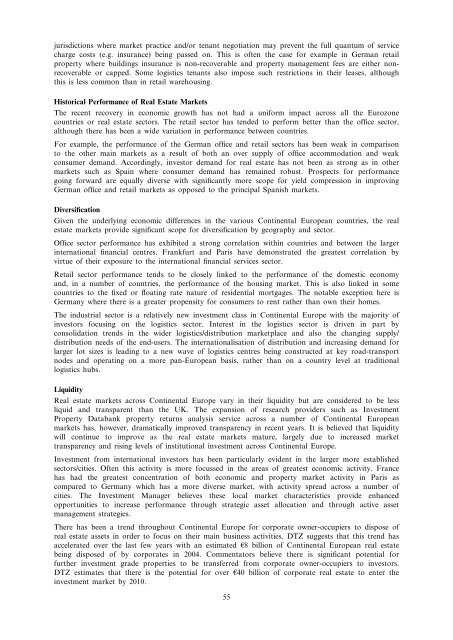Create successful ePaper yourself
Turn your PDF publications into a flip-book with our unique Google optimized e-Paper software.
jurisdictions where market practice and/or tenant negotiation may prevent the full quantum of service<br />
charge costs (e.g. insurance) being passed on. This is often the case for example in German retail<br />
property where buildings insurance is non-recoverable and property management fees are either nonrecoverable<br />
or capped. Some logistics tenants also impose such restrictions in their leases, although<br />
this is less common than in retail warehousing.<br />
Historical Performance of Real Estate Markets<br />
The recent recovery in economic growth has not had a uniform impact across all the Eurozone<br />
countries or real estate sectors. The retail sector has tended to perform better than the office sector,<br />
although there has been a wide variation in performance between countries.<br />
For example, the performance of the German office and retail sectors has been weak in comparison<br />
to the other main markets as a result of both an over supply of office accommodation and weak<br />
consumer demand. Accordingly, investor demand for real estate has not been as strong as in other<br />
markets such as Spain where consumer demand has remained robust. Prospects for performance<br />
going forward are equally diverse with significantly more scope for yield compression in improving<br />
German office and retail markets as opposed to the principal Spanish markets.<br />
Diversification<br />
Given the underlying economic differences in the various Continental European countries, the real<br />
estate markets provide significant scope for diversification by geography and sector.<br />
Office sector performance has exhibited a strong correlation within countries and between the larger<br />
international financial centres. Frankfurt and Paris have demonstrated the greatest correlation by<br />
virtue of their exposure to the international financial services sector.<br />
Retail sector performance tends to be closely linked to the performance of the domestic economy<br />
and, in a number of countries, the performance of the housing market. This is also linked in some<br />
countries to the fixed or floating rate nature of residential mortgages. The notable exception here is<br />
Germany where there is a greater propensity for consumers to rent rather than own their homes.<br />
The industrial sector is a relatively new investment class in Continental Europe with the majority of<br />
investors focusing on the logistics sector. Interest in the logistics sector is driven in part by<br />
consolidation trends in the wider logistics/distribution marketplace and also the changing supply/<br />
distribution needs of the end-users. The internationalisation of distribution and increasing demand for<br />
larger lot sizes is leading to a new wave of logistics centres being constructed at key road-transport<br />
nodes and operating on a more pan-European basis, rather than on a country level at traditional<br />
logistics hubs.<br />
Liquidity<br />
Real estate markets across Continental Europe vary in their liquidity but are considered to be less<br />
liquid and transparent than the UK. The expansion of research providers such as Investment<br />
Property Databank property returns analysis service across a number of Continental European<br />
markets has, however, dramatically improved transparency in recent years. It is believed that liquidity<br />
will continue to improve as the real estate markets mature, largely due to increased market<br />
transparency and rising levels of institutional investment across Continental Europe.<br />
Investment from international investors has been particularly evident in the larger more established<br />
sectors/cities. Often this activity is more focussed in the areas of greatest economic activity. France<br />
has had the greatest concentration of both economic and property market activity in Paris as<br />
compared to Germany which has a more diverse market, with activity spread across a number of<br />
cities. The Investment Manager believes these local market characteristics provide enhanced<br />
opportunities to increase performance through strategic asset allocation and through active asset<br />
management strategies.<br />
There has been a trend throughout Continental Europe for corporate owner-occupiers to dispose of<br />
real estate assets in order to focus on their main business activities. DTZ suggests that this trend has<br />
accelerated over the last few years with an estimated A8 billion of Continental European real estate<br />
being disposed of by corporates in 2004. Commentators believe there is significant potential for<br />
further investment grade properties to be transferred from corporate owner-occupiers to investors.<br />
DTZ estimates that there is the potential for over A40 billion of corporate real estate to enter the<br />
investment market by 2010.<br />
55


